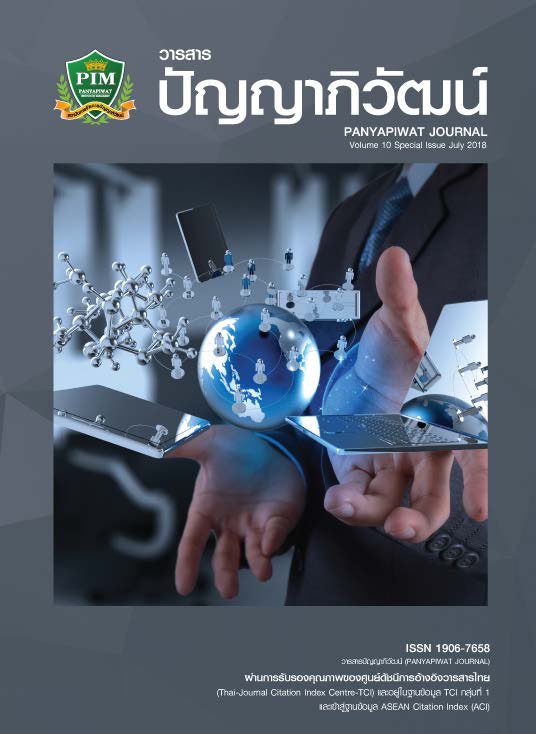ผลสัมฤทธิ์จากการเรียนแบบห้องเรียนกลับด้านร่วมกับการสอนแบบบรรยาย ในวิชาการจัดการฟาร์ม ของนักศึกษาระดับปริญญาตรี สาขาวิชาการจัดการเทคโนโลยีฟาร์ม
Main Article Content
บทคัดย่อ
การวิจัยครั้งนี้ศึกษาผลสัมฤทธิ์จากการเรียนแบบห้องเรียนกลับด้านร่วมกับการสอนแบบบรรยาย ในวิชาการจัดการฟาร์ม ของนักศึกษาที่ลงทะเบียนเรียนวิชาการจัดการฟาร์ม ในภาคเรียนที่ 2 เทอม 2.1 ปีการศึกษา 2559 จำนวน 36 คน ที่ได้มาโดยการเลือกอย่างเจาะจง เครื่องมือที่ใช้ในการทดลองคือ แผนการเรียนรู้ 4 แผน คือ 1) การฝึกทักษะการจับใจความและสรุป 2) การฝึกทักษะการเรียนรู้ด้วยตนเองผ่านการสืบค้นข้อมูลความรู้ด้วยเทคโนโลยีสารสนเทศ 3) การฝึกทักษะการทำงานเป็นทีม และ 4) การฝึกทักษะการนำเสนอหน้าชั้นเรียน ใช้เวลาในการทดลอง 10 คาบ ระยะเวลา 10 สัปดาห์ ดำเนินการทดลองแบบกลุ่มทดลองเดียว (One group Pretest-Posttest Design) วัดผลก่อนและหลังการทดลอง วิเคราะห์ข้อมูลโดยหาค่าเฉลี่ย ส่วนเบี่ยงเบนมาตรฐาน และเปรียบเทียบผลสัมฤทธิ์ทางการเรียนก่อนและหลังเรียนด้วยสถิติทดสอบค่าทีแบบอิสระ (t-test)
ผลจากการเปรียบเทียบผลสัมฤทธิ์ทางการเรียนของนักศึกษาจากการทำแบบทดสอบก่อนเรียนและหลังเรียน พบว่า ผลสัมฤทธิ์จากการเรียนแบบห้องเรียนกลับด้านร่วมกับการสอนแบบบรรยาย ในวิชาการจัดการฟาร์ม จากการทำแบบทดสอบหลังเรียนสูงกว่าก่อนเรียนอย่างมีนัยสำคัญทางสถิติ .01 ซึ่งเป็นไปตามสมมติฐานที่ตั้งไว้ จากผลการประเมินความพึงพอใจของนักศึกษาต่อกิจกรรมการเรียนแบบห้องเรียนกลับด้าน พบว่า ระดับความพึงพอใจมากที่สุดคือ วิธีการใช้สื่อวีดิทัศน์ (VDO) ในการสอน (4.43±0.55) ส่วนระดับความพึงพอใจที่น้อยที่สุดจากการประเมินของนักศึกษาคือ บทเรียนออนไลน์ผ่าน e-learning (4.11±0.46) เนื่องจากระบบอินเทอร์เน็ตของสถาบันมีปัญหาขัดข้องในการใช้งานบ่อยครั้ง
Article Details
“ข้าพเจ้าและผู้เขียนร่วม (ถ้ามี) ขอรับรองว่า บทความที่เสนอมานี้ยังไม่เคยได้รับการตีพิมพ์และไม่ได้อยู่ระหว่างกระบวนการพิจารณาลงตีพิมพ์ในวารสารหรือแหล่งเผยแพร่อื่นใด ข้าพเจ้าและผู้เขียนร่วมยอมรับหลักเกณฑ์การพิจารณาต้นฉบับ ทั้งยินยอมให้กองบรรณาธิการมีสิทธิ์พิจารณาและตรวจแก้ต้นฉบับได้ตามที่เห็นสมควร พร้อมนี้ขอมอบลิขสิทธิ์บทความที่ได้รับการตีพิมพ์ให้แก่สถาบันการจัดการปัญญาภิวัฒน์หากมีการฟ้องร้องเรื่องการละเมิดลิขสิทธิ์เกี่ยวกับภาพ กราฟ ข้อความส่วนใดส่วนหนึ่งและ/หรือข้อคิดเห็นที่ปรากฏในบทความข้าพเจ้าและผู้เขียนร่วมยินยอมรับผิดชอบแต่เพียงฝ่ายเดียว”
เอกสารอ้างอิง
Burapapichitpai, P. (2015). The Flipped Classroom and Learning Management in Thailand. Department of Educational Technology, Faculty of Education, Kasetsart University. [in Thai]
Changkwanyeun, A. & Sittiwong, T. (2016). The Flipped Classroom and Project Based Learning on the Introduction to Computer Information Science for Undergraduate Students. Division of Research Administration. Research Naresuan, 12. [in Thai]
Hongkhuntod, A. (2013). Flipped Classroom. Retrieved August 17, 2016, form https://porntippalacheewa.wordpress.com/2014/05/07/%E0%B8%AB%E0%B9%89%E0%B8%AD%E0%B8%87%E0%B9%80%E0%B8%A3%E0%B8%B5%E0%B8%A2%E0%B8%99%E0%B8%81%E0%B8%A5%E0%B8 %B1%E0%B8%9A%E0%B8%94%E0%B9%89%E0%B8%B2%E0%B8%99-flipped-classroom/
Lage, M. J., Platt, G. J. & Treglia, M. (2000). Inverting the Classroom: A Gateway to Creating an Inclusive Learning Environment. The Journal of Economic Education, 31(1), 30-43.
Ministry of Education. (2002). National Education Act B.E. 2002. Bangkok: Express Transportation Organization of Thailand. [in Thai]
Pahay, S. (2009). The Flipped Classroom: New Classrooms Dimension in the 21st Century. Retrieved August 17, 2017, from https://phd.mbuisc.ac.th/academic/flipped%20classroom2.pdf [in Thai]
Phetaurai, W. (2013). Achievement of Blended Learning in Rubber Processing for Undergraduate Student in Rubber and Polymer Technology Program. Classroom research. Faculty of Engineering and Agro-Industry, Maejo University. [in Thai]
Pongsawat, P. & Jeerungsuwan, N. (2015). The Instruction Design Flipped Classroom Model by Using WebQuest Activities to Develop Learning Skills in The 21st Century for Students in Higher Education. Technical Education Journal King Mongkut’s University of Technology North Bangkok, 6(1), 151-158. [in Thai]
Schoolwires. (2013). The Flipped Classroom: A New Way to Look at Schools. Retrieved September 1, 2017, from https://www.rjuhsd.us/site/handlers/filedownload.ashx?moduleinstanceid=1702&dataid=2257&FileName=White_Paper_on_Flipped_Class.pdf
Sutbonit, S., Tayraukham, S. & Kumpol, B. (2013). Comparison of Learning Responsibilities Attitudes towards Learning and Learning Achievement in Science subject of Matthayomsueksa 1 Students Who Learned Using Flipped Classroom Activities and Traditional Learning Activities. Journal of Education Mahasarakhan University, (Special Issue), 164-178. [in Thai]
Thongsoontorn, P. (2014). The Flipped Classroom. Classroom research. Assumption College. [in Thai]
Udomthawee, W. (2013). The Development of Integrative Thinking and Learning Achievement of Grade 9 Students on North and South America Geography Using Problem-Based Learning and Flipped Classroom Technique. Master’s Thesis in Education, Khon Kaen University. [in Thai].
U-sen, N., Portjanatanti, N. & Rorbkorb, N. (2017). Effect of Flipped Classroom Approach on Science Achievement, Self-Directed Learning and Scientific Attitudes of Grade 11 Students. Journal of Education Prince of Songkla University, 28, 156-165. [in Thai]


